Will battle of long guns finally lead to something serious in Ottawa?
Sep 14th, 2010 | By Randall White | Category: In Brief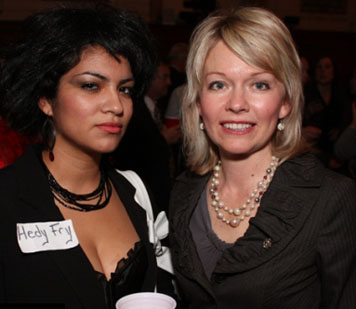
MP Candice Hoeppner (right) with her (un-named) staffer supposedly dressed as Liberal MP Hedy Fry, at Conservative Party of Canada Halloween party, 2009.
[UPDATED SEPTEMBER 16: SEE BELOW.] Much has been written and otherwise communicated about the federal long-gun registry in Canada lately. One of the more sensible commentaries has been Andrew Coyne’s piece in Macleans.ca last Friday, “The long-gun registry’s value is only symbolic.”
Mr. Coyne writes (not without a suitably sardonic Canadian sense of political humour, presumably): “One thing all the parties agree on is the vital importance of the long-gun registry.” But “like most critical, make-or-break issues in politics, it’s of little actual importance to anyone. Whether the registry lives or dies will have no impact whatsoever on the vast majority of Canadians, and scarcely more on the minority that pay it close attention.”
As true as all this may be (or even almost certainly is), it also seems virtually certain that the next big event in Canadian federal politics will be the September 22 parliamentary vote “on a Liberal motion to throw out … Conservative MP Candice Hoeppner’s private member’s bill to scrap the controversial long-gun registry.”
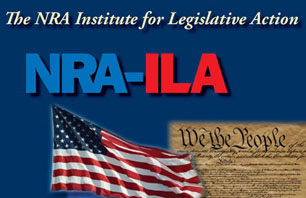
Some have urged that the National Rifle Association in the United States has supported the Hoeppner bill to end the long gun registry in Canada. Conservative MP Pierre Poilievre has recently denied that there are “personal links between the federal Conservatives and the National Rifle Association.”
(And if you really must know more about the background to all this, you can check out an extended Winnipeg TV interview with the not unattractive and quite bright enough Ms. Hoeppner, MP for Portage–Lisgar in southern Manitoba. If you don’t want to watch a TV interview, you can read Candice Hoeppner’s own report on her LONG-GUN REGISTRY BILL C-391, a Wikipedia article on “Canadian Firearms Registry,” and/or the official site on the “Canadian Firearms Program,” which is administered by the RCMP.)
Andrew Coyne is close to dead-on, I think. Practically, the great long-gun registry debate makes next to no sense. But it has nonetheless become a symbol of the allegedly vast rural-urban divide in Canada, with all its attendant misunderstandings and knee-jerk parochialism on either side.
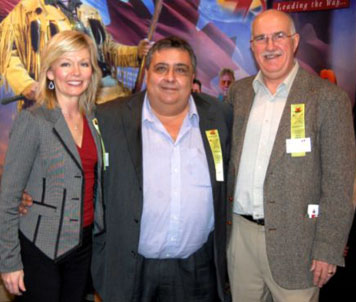
Members of Parliament Candice Hoeppner (l) and Garry Breitkreuz (r) with Ontario gun advocate Tony Bernardo, at Calgary Gun Show (“the largest gun show in Canada”), April 2—3, 2010.
Trapped in a jungle of stereotypes, the Conservatives are championing the ancient agrarian democratic virtues of rural life. The Liberals (and others) are standing up for modern democratic progress – and (oddly enough Mr. Harper) traditional Canadian “law and order” –Â in various (if not all) big and other cities, coast to coast to coast.
For a time it seemed that the struggle over Candice Hoeppner’s private member’s bill had also become something of a proving ground for a new wave of internecine warfare on the progressive centre-left of the Canadian federal political spectrum. The (allegedly) more urbane Liberals (and Bloc Québécois) were crazily lining up against the old agrarian democratic (and Western Canadian) side of the New Democrats.
Now the Globe and Mail is reporting: “Tories poised for defeat on gun registry … Rural NDP MPs persuaded to change vote, Layton announces.” And all of a sudden the practically important question becomes: is Candice Hoeppner at least half-right when she complains on her Bill C-391 web page that the “Liberal-Bloc Quebecois-NDP coalition is working together to derail my bill which would end the wasteful and ineffective long-gun registry”?
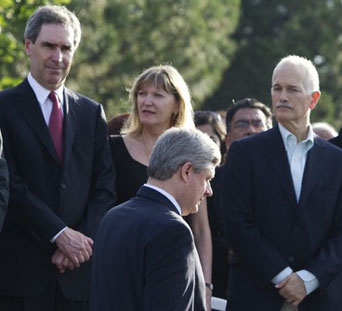
Stephen Harper walks by Michael Ignatieff and Jack Layton at Air India monument in Toronto, June 23, 2010. Was this just the beginning of a new game of musical chairs?
Or, more exactly (and accurately), will the forthcoming September 22 vote on the Hoeppner bill finally prove an early dress rehearsal for a Liberal-NDP accord in the wake of the next Canadian federal election, supported as and if necessary by a not directly involved but democratically elected BQ parliamentary majority in Quebec, at a respectful arms’ length. And will this new kind of cooperative government in Ottawa at last provide some workable progressive alternative to the Harper minority Conservatives, with serious support in all regions of the country?”
(Don Martin at the National Post, it is true enough, says “Tories thrilled by NDP’s rumoured saving of the gun registry.” Like Ms. Hoeppner, he is assuming that many strategic voters will be angry about the defeat of her bill, to the ultimate advantage of PM Harper. But that may ignore the perhaps deeper practical wisdom of Andrew Coyne: “Whether the registry lives or dies will have no impact whatsoever on the vast majority of Canadians”?) FOR SEPTEMBER 16 UPDATE CLICK ON “Read the rest of this page” BELOW [and/or just read on below].
UPDATE SEPTEMBER 16: Some of the particulars behind Jack Layton’s plot to win former NDP Canadian Shooting Sports acolytes over to the Coalition for Gun Control camp have begun to emerge. See, eg: “Trumpeting rural roots, NDP predicts Tory defeat on gun registry … Four of the original 12 had declared publicly their intention to switch their votes at the time, and on Thursday Carol Hughes became the fifth.”
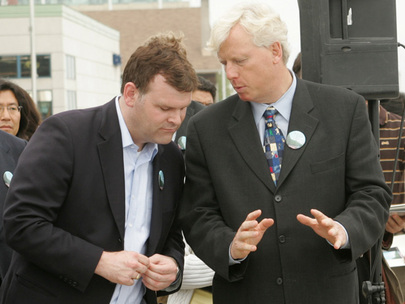
John Baird (l) and Toronto Mayor David Miller in happier days. Sometimes even Conservative cabinet ministers find it useful to listen to Toronto elites – insofar as they actually exist in the 21st century?
The Conservatives are complaining that those New Democrats (and Liberals) who voted with them on the Hoeppner bill late last year, but are now changing their minds, are just letting themselves be bullied by “Toronto elites” (rather than the “Calgary elites” who bullied them last year?: see appendix below for details on the second reading vote in 2009). For a case in point here try: “Toronto ‘elites’ behind push to save gun registry, Baird says.”
Those at the western and eastern extremes of the country – in BC and Nova Scotia, eg – may have trouble understanding just what John Baird is getting at. See, eg: “Firearms registry saves lives, BC’s top cops say” ; and “Women’s groups, docs, police say long-gun registry critical to preventing crime … A coalition of women’s groups, police chiefs and emergency room staff in Nova Scotia is urging Ottawa to maintain the long-gun registry, arguing the program is critical to fighting domestic violence.”
Meanwhile, no less objective an observer than Chantal Hébert is urging: “Gun crossfire will dog Layton in the next campaign … It is now clear that at the end of the day, the NDP leader would rather take the risk of leaving his flank open to Conservative attacks in rural Canada than give the Liberals and the Bloc a wedge issue with which to go after his urban and Quebec votes … The outcome of the next federal campaign rather than the current Parliament may yet determine the ultimate fate of the gun registry. If the result of the election was to mirror the Liberal/Conservative photo-finish that some polls currently herald, the verdict of the voters in half-a-dozen or more rural NDP ridings could turn the loser of next week’s registry vote into an election winner.”

Green Party of Canada leader Elizabeth May – not getting her fair share of media attention lately, as someone whose party is now “moving along at a solid 10% in the polls, which is about the same number the Reform Party was getting before its breakthrough in the 1993 election.”
While I am a great admirer of Chantal Hébert’s political analysis, I remain somewhat sceptical about this kind of prognosis – even when it comes from someone like her. But of course she may be right. “Give me a majority government, so I can kill the long-gun registry once and for all” does not sound quite like a winner to me, at the moment at least. It is true enough, however, that Mr. Harper only needs to win just under a dozen more seats than he did in 2008 for a bare parliamentary majority. And no realistic fan of the political blood sport can write off this prospect.
Meanwhile again, for an intriguing argument that the next Canadian federal election actually may come sooner than the smartest money currently thinks – and even before the end of this year – see Lawrence Martin’s Globe and Mail column yesterday: “The Greens’ funky leader sees a Harper election plot … It’s all about voter shrinkage, according to Elizabeth May.”
Appendix: the changing numbers for September 22
The long-gun registry issue is where it is right now – or will be on September 22 – because Ms. Hoeppner’s bill to scrap it actually passed second reading in the Canadian House of Commons late last year, by a vote of 164 to 137.
Voting to support the bill then were 143 Conservatives, 12 New Democrats, eight Liberals, and one Independent (André Arthur from Portneuf–Jacques-Cartier in Quebec: arguably the closest thing la belle province has to Rush Limbaugh in the USA?).
Second reading, however, only moves the bill along in the legislative process. To finally become law it must pass third reading – still some time ahead. What is happening on September 22 is a Commons vote on what amounts to a Liberal motion to scrap Ms. Hoeppner’s bill to scrap the long-gun registry, before it even reaches third reading.
(And so even if the bill survives this September 22 vote immediately ahead, it still could be defeated on third reading somewhat further down the road – still further evidence of how subtly absurd everything in this corner has become. But set all that aside for the moment.)
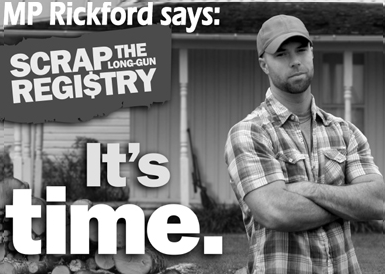
The campaign for the Hoeppner bill was on tour this summer, stopping, eg, in Conservative MP Greg Rickford’s northern Ontario riding of Kenora.
With just a minority in parliament, the Conservatives cannot of course defeat the Liberal motion to scrap Candice Hoeppner’s bill to scrap the long-gun registry all by themselves. There will apparently be a maximum of 305 MPs present for the September 22 vote – which means 153 votes will be required for a bare majority: or at least 10 more than the Conservatives themselves showed on second reading last fall.
One thing we also know at the moment is that on this coming September 22 there will be less than the 164 MP s who voted for the bill on second reading last fall. To start with, Liberal leader Michael Ignatieff has announced that the September 22 Liberal vote will be “whipped”; i.e., all Liberal MP s will be required to support the party line against Ms. Hoeppner’s bill (and for the long-gun registry) this time.
Until tonight’s announcement by Jack Layton, all we knew as well was that at least four of the 12 New Democrats who supported Candice Hoeppner’s bill on second reading will not be supporting the bill on September 22. Unlike the Ignatieff Liberals, the Layton New Democrats were apparently not going to be “whipped” for this vote. But along with the eight whipped Liberals, the four New Democrats who had switched sides of their own accord seemed to have put Ms. Hoeppner’s bill at great risk.
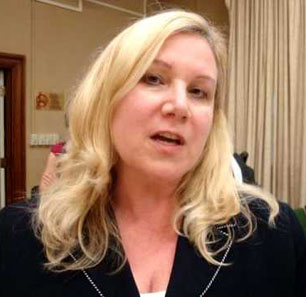
Wendy Cukier, Ryerson University professor and founder of the Coalition for Gun Control believes Canada should keep the long gun registry.
There were various more detailed calculations over the past several days. See, eg: “Tory tactics driving NDP MPs to back gun registry” ;“Fourth New Democrat switches vote on gun registry” ; “Another NDP MP flips sides in gun registry showdown” ; “Another New Democrat flips on gun registry vote” ; and “Gun registry vote to be a ‘nail-biter.’”
Then late yesterday the Globe and Mail had reported that: “The battle over the future of the long-gun registry is narrowing as a clash of rural and urban values could very well bring about a tie vote on the floor of the House of Commons … Various vote projections circulating on Parliament Hill include predictions of a one- or two-vote victory by the Conservatives or a tie … If it’s a tie vote, House of Commons Speaker Peter Milliken –Â a Kingston-area Liberal MPÂ – is expected to vote with the Conservatives, not the Liberals, because of a precedent that Speakers vote to continue a debate.”
These calculations seemed to be broadly supported by a CBC report as well: “with the Liberals and the Bloc Quebecois poised to vote on Sept. 22 to halt Hoeppner’s bill, and the Conservatives set to vote the other way, the fate of the registry lies with the NDP … Six NDP MPs who previously voted in favour of Hoeppner’s bill have said they will not change their vote to scrap the registry … Allen’s switch [ie Malcolm Allen, the fourth NDP MP to announce he will switch his vote from last fall] brings the number of MPs who have declared their support or opposition to Hoeppner’s bill to a 151-151 tie … Manitoba NDP MP Niki Ashton (Churchill) has yet to indicate how she will vote. And NDP MP Carol Hughes (Algoma-Manitoulin-Kapuskasing), has said she will not vote to scrap Hoeppner’s bill on Sept. 22, but wouldn’t say what side she would choose if the bill reaches a vote on third reading.”
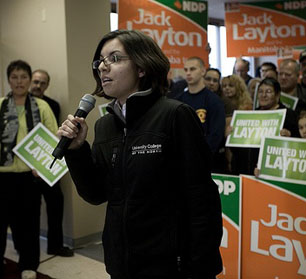
Niki Ashton, NDP MP from Churchill, Manitoba. Is she one of the new Hoeppner bill opponents from a rural New Democratic riding?
In its most interesting phases, however, Canadian federal politics is full of surprises. And suddenly at 3:42 PM EDT this afternoon Bill Curry at the Globe and Mail was reporting: “NDP Leader Jack Layton says he has persuaded ‘an overwhelming majority’ of his rural caucus to vote next week to defeat a Conservative private member’s bill on the gun registry … So far, only four of the 12 rural NDP MPs who had previously voted against the registry have announced they would switch their vote. Mr. Layton’s remarks suggest that at least three more will make similar announcements when they return to their ridings after the Regina caucus.”
A similar report from Mr. Curry, published at 8:08 PM EDT elaborated somewhat: “The Conservative campaign to scrap the long-gun registry is poised for defeat next week after NDP Leader Jack Layton announced he’s persuaded enough of his rural caucus to vote in favour of killing the Tory bill … ‘My commitment to Canadians was to put forward an approach to fix the registry,’ Mr. Layton said. ‘After our discussions, an overwhelming majority of our rural caucus is supporting my approach and I know that this is going to work’ … So far, only four of the 12 rural NDP MPs who had previously voted against the registry have announced they would switch their vote. Mr. Layton’s remarks suggest that at least three more will make similar announcements when they return to their ridings after the Regina caucus, but he would not confirm names or numbers.” (The italics here are mine. Who knows just what this phrase, added to the 8:08 EDT report, might finally prove to mean on September 22?)
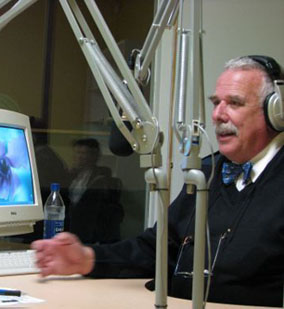


[…] This post was mentioned on Twitter by Gerry Schroeder, Gold Country FNRA. Gold Country FNRA said: Will battle of long guns finally lead to something important in … http://bit.ly/cffdPr […]
http://topsy.com/www.counterweights.ca/2010/09/will-battle-of-long-guns-finally-lead-to-something-important-in-ottawa/?utm_source=pingback&utm_campaign=L2